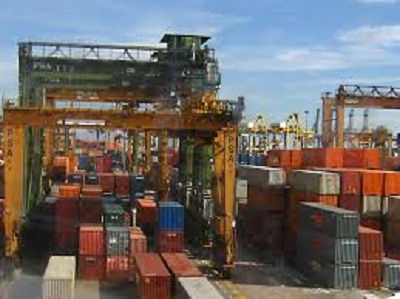13 February 2016, Lagos – With two ship-loads of cargoes and vessel detained in Lagos on allegation of midstream discharge and berthing secretly in private jetties, industry stakeholders believe such trade malpractices and attendant revenue losses will soon come to an end with the Cargo Tracking Note (CTN) recently introduced by Nigeria Shippers Council, the ports economic regulator, writes Francis Ugwoke
 Shipping as many say is a mafia business. The scenario is that most times, somebody wants to cheat. It could be the provider of shipping services who wants to cheat the consumer, taking advantage of a helpless situation . Other times, it could be a conspiracy between the provider and consumer of shipping services. This is what happens in the case of midstream discharge or a ship berthing at undesignated area. Midstream discharge in shipping terms means offloading goods on board a ship at the high sea or undesignated place where government agencies may lack the capacity to access.
Shipping as many say is a mafia business. The scenario is that most times, somebody wants to cheat. It could be the provider of shipping services who wants to cheat the consumer, taking advantage of a helpless situation . Other times, it could be a conspiracy between the provider and consumer of shipping services. This is what happens in the case of midstream discharge or a ship berthing at undesignated area. Midstream discharge in shipping terms means offloading goods on board a ship at the high sea or undesignated place where government agencies may lack the capacity to access.
Among those involved in this fraud, it was gathered, were some multinational agencies that simply discharge midstream, settle relevant people and set sail before the news could spread. It is in connivance with the owners of the goods for obvious reasons. Members of the Maritime Workers Union of Nigeria (MWUN) had lamented over this trend in the past to no avail. The intention in most cases is to evade payment of correct duties or for other obvious reasons, including apprehension over security checks.
But there are cases when midstream discharge is allowed. For instance, there are vessels which the nation’s ports by the draught level of each port, may not have facility to handle, and are allowed to discharge midstream where smaller vessels or barges are brought in for transshipment purposes. Baco Liners are among such vessels, or any other vessel that government authorities may allow to berth midstream.
However, whether a ship involved in midstream discharge has approval or not, there is always fraud involved. First is that the owners will always under-declare the gross registered tonnage (GRT) of the vessel, since how much charges the ship pays depends on this. There is also the likelihood that the importer will also under-declare the exact quantity of the goods. The beneficiary of this fraud are both ship-owner and the importer, including some officials and security operatives working for agencies. In 2001, the former minister of Transport, Chief Ojo Maduekwe made a pronouncement stopping the Nigerian Ports Authority (NPA) from allowing midstream discharge. Maduekwe issued the directive to check the fraud that was going on in such exercise.
The federal government had subsequently placed a total ban on midstream discharge and also revoked the licences of 276 private jetties. Other administrations had reinforced the ban. This was on realising how much government was losing in such exercise, apart from the security implications. Midstream discharge, according sources, is common to oil marketers and their carriers who would come into the country and remain midstream to discharge their wet cargoes, settling all necessary officials and operatives and sailing free. One can imagine how much government would have lost in this scam. Some were even using private jetties, forcing government again to place a ban on private jetties over illegal activities.
and their carriers who would come into the country and remain midstream to discharge their wet cargoes, settling all necessary officials and operatives and sailing free. One can imagine how much government would have lost in this scam. Some were even using private jetties, forcing government again to place a ban on private jetties over illegal activities.
It would be recalled some years back that the Department of Petroleum Resources (DPR) had uncovered the use of illegal jetty in Kirikiri waters where discharge of petroleum products was going on. The officials of the agency had discovered four barges with diesel, otherwise known as Automative Gas Oil (AGO). The barges and cargoes were impounded by the DPR. But despite the ban from all fronts as it seems, some die-hard ship-owners and cargo owners have continued to try their luck. Apart from those unknown cases, two cargo vessels were recently intercepted while berthing at a place not designed for such activity, in what has now become another type of midstream discharge. The two recorded cases took place in two private terminals. To observers, the intention cannot be any other than fraud.
Customs Moves Against Two Ships
Perhaps, if not for the Nigeria Customs Service (NCS), the two ships which berthed at undesignated areas, secretly using private facilities in Lagos, would have gone free. In December16, a vessel, MV Torco Clairvaux, was alleged to have berthed illegally at a terminal owned by an indigenous company which is into oil and gas services and repair yard. The yard is located at the free trade zone.
However, on receiving information about the vessel, the Comptroller-General of the Customs, Col Hammed Ali(rtd) had ordered the detention of the cargo brought by the ship, which apparently escaped arrest. It was not clear what had become of the goods seized from the vessel. About a week ago, a similar incident occurred when another vessel, MV Drago J. also berthed at a free zone, another terminal in Snake Island in Lagos. Incidentally, the terminal where MV Torco Clairvaux berthed is within the same environment where MV Drago J berthed. The only thing is that they were berthed in two different terminals. The customs detained both ship and cargoes on the order of Ali. The officials of the terminal later resorted to begging the customs to board the ship for inspection, apparently worried about the cost the vessel was incurring with the detention.
In the case of the Snake Island ship, the Customs leadership appears unconvinced that some customs officers were not involved in some form of compromise. This indication followed a circular that was signed by a Deputy Comptroller-General, Ms Grace Adeyemo, on behalf of the Comptroller-General. The letter which was sent to Command reads: “Intelligence reports reaching headquarters indicate some form of compromise by officers where deliberate acts of impunity are perpetuated through illegal berthing of ships/vessels and mid-stream discharge of cargo other than officially designated Customs Ports despite existing circulars. In effect, I am directed to reiterate and convey the Comptroller-General of Customs directive on strict enforcement of the Extant Laws and Circulars in that regard.”
The circular continued: “That on no circumstance should any ship/vessel coming in from foreign, berth at any other place other than the conventional ports first. Where any of such ship/vessel is Free Zone-bound or designate, it shall set sail thereafter under official escort of the Enforcement Unit of the Command for further official processes.”
Public Relations Officer of the Tin Can Customs Command, Mr. Chris Osunkwo, said no officer is allowed to board the vessel for any inspection until there is a directive to that effect. It is being estimated that the revenue loss to the country as a result of such illegal act is put at over N2.5billion. It was gathered that the owner of the cargo later paid the N2.5billion to the Customs. This amount would have been lost if not for the customs intervention.
CTN to the Rescue
Apparently worried about the malpractices involving ships and shippers in some cases, industry stakeholders believe strongly that the Cargo Tracking Note (CTN) that was introduced recently by the Nigerian Shippers’ Council (NSC) is coming at the right time. President of the National Association of Government Approved Freight Forwarders (NAGAFF), Dr, Eugene Nweke, opined that such fraudulent practices, including midstream discharge took place because of the absence of relevant instruments of technology to monitor movement of cargoes and discharge operations. Nweke said with the introduction of CTN, he has no doubt that such fraud, among other trade malpractices would abate. Nweke, believes that with CTN now under the Nigerian Shippers Council , all forms of illegal midstream through which the government had lost billions of Naira revenue and the security risk would be over.
The freight forwarder said the CTN component of the ISPS Code will provide relevant information that would help monitor maritime security threats and provide shipping and cargo information, which will assist in risk profiling of vessels, crew members, ports of calls, mid-stream operations and cargo characteristics, which will be tracked from port of loading to port of final destination”. Similarly, the Executive Secretary, Nigerian Shippers’ Council, Mr. Hassan Bello, told the visiting members of the House Committee on Maritime led by Dr. Pat Asadu that CTN will check all forms of fraudulent practices involved in shipping services in the ports.
CTN, Bello said, has security benefits for the country and will check concealment and , under-declaration of cargo through which government loses billions of Naira revenue. He also said CTN will equally check a situation where the GRT of vessels is falsified to evade payment of correct duties.
- This Day



